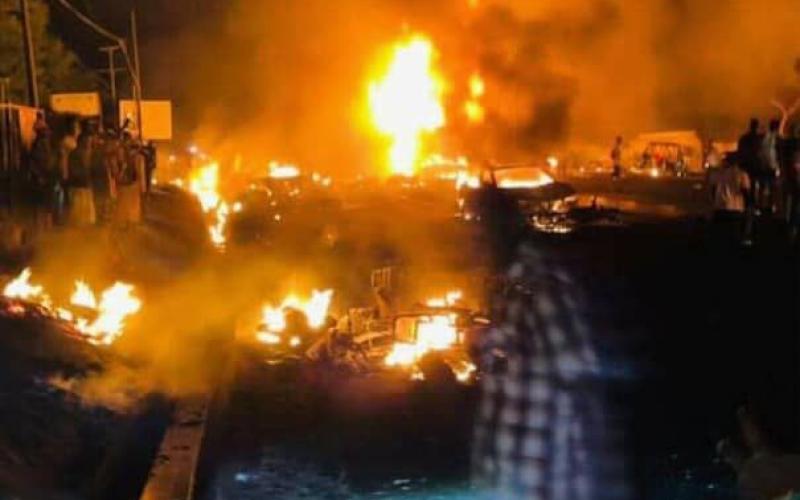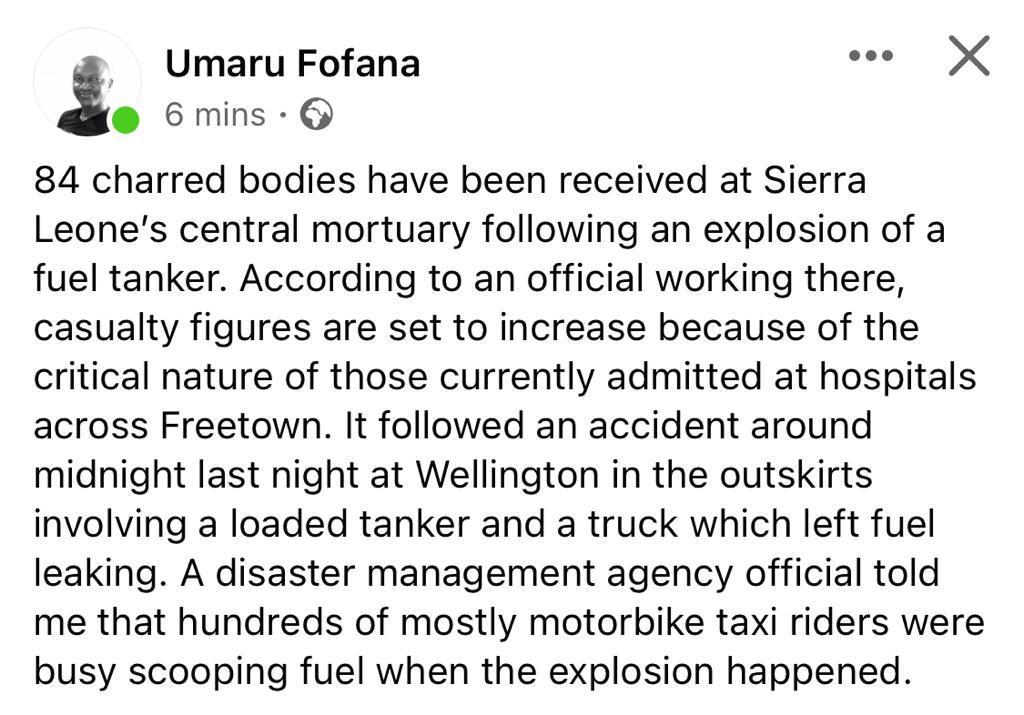
While millions of Americans were focused on declining COVID-19 cases and the passage of an important infrastructure bill in November of 2021, a sad and tragic event was occupying the minds and hearts of those from Sierra Leone. On November 5th, a collision occurred between an oil tanker and a truck in the streets of Freetown, Sierra Leone’s capital. According to U.S. News and World Report, the death toll has risen to over 145 deaths and over 300 injuries. Many people were trapped inside their own vehicles, while others were stuck inside burning buildings. In what was a terrible surprise to me, most of the deaths were not caused by the initial accident, but rather from people rushing to try and recover the spilled fuel. It was incredibly powerful to me that the citizens of Freetown were so impacted by a nationwide oil shortage that people were willing to disregard their own safety and run into a massive crash sight with buckets.
This explosion was devastating for the families of the victims and other Sierra Leoneans. The tragic event also drastically overwhelmed the city’s medical services. Dr. Mustapha Kabbah, a surgeon at Connaught Freetown Hospital with 20 years' experience said "A medical emergency of this magnitude I've never experienced before in all my career as a medical doctor." (BBC article) Many Freetown hospitals don’t have ventilators, burn units or vital signs monitors; so it is remarkable that they were able to treat badly burned patients and keep so many of them alive. Sierra Leone’s president, Julius Maada Bio, offered his condolences tweeting “My profound sympathies with families who have lost loved ones and those who have been maimed as a result,” promised support for the victim’s families and set up a task force that will provide recommendations to avoid similar disasters in the future (The Guardian article). The government is attempting to take the correct steps to recover from this tragedy, but the question that remains with me is how will the local communities and families of the victims recover?

This explosion slowly faded out of international and then national news, but the victims remain. Hundreds of households were directly affected by the explosion and even more households lost friends and valued members of society. Many people lost money and businesses and don’t know how to rebound from this tragedy. I have never experienced anything like this event in Freetown, but I have to envision that the road to recovery will likely be lengthy and difficult. From an outsider’s perspective, a combination of Sierra Leonean resolve and international support is what the families and communities are leaning on to overcome this catastrophe.
From what I have learned, the people of Freetown have responded to this accident with astounding courage. Immediately following the accident, many non-medical workers were seen running into the smoke in order to rescue potential survivors, and they did so without gas masks or other tools to prevent them from the toxic smoke. Another example is that despite a lack of resources, the doctors and nurses of Freetown were able to treat hundreds of burn victims immediately after the explosion despite a lack of proper medical facilities and equipment.
International non-governmental support has also been critical to the recovery efforts. The Philadelphia Inquirer reported on a team of doctors from Temple University, a public university in Pennsylvania, immediately flying to Sierra Leone to help treat the burn victims. These doctors brought their medical expertise and high-tech equipment with them - and were able to efficiently treat dozens of patients in a short amount of time. However, when these doctors arrived at the hospitals, they were shocked at the lack of medical resources that the doctors and nurses of Freetown had to do without. They were also surprised to see the medical workers of Freetown using makeshift mosquito nets and doing their best to treat people despite lacking the proper medicine.
Develop Africa is working to create long-term answers to these problems - providing access to education, etc. People in Sierra Leone have the resolve and courage to stop and deal with these disasters, but sometimes lack the necessary education or medical equipment. With our help, access to necessary medical equipment and education to deal with future disasters such as this one can be facilitated. The people of Sierra Leone have been through civil wars, natural disasters, Ebola outbreaks, and much more. They deserve our help and even a small donation can translate to saving lives. Develop Africa is a bridge that allows you to reach people and change their lives for the better.
Recommendations:
After writing this article, I have some ideas that might help avoid this type of accident in the future or help people respond more effectively to this type of crisis.
- One would be that the Sierra Leone government could put out public service announcements on the radio, television, and internet with recommendations about what to do, and not to do, in the case of a fuel oil spill and other potential fire hazards.
- Another solution to mitigating injuries could be public service announcements or free training on how people should respond if you or someone around you is badly
By Oliver Smith

